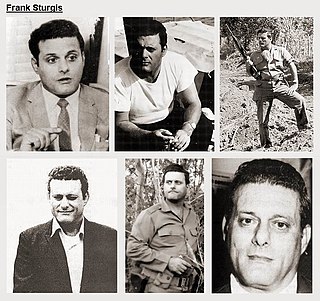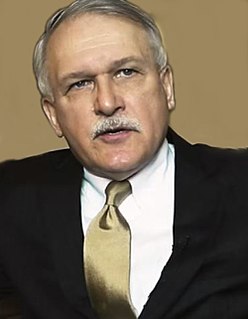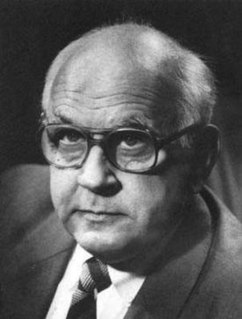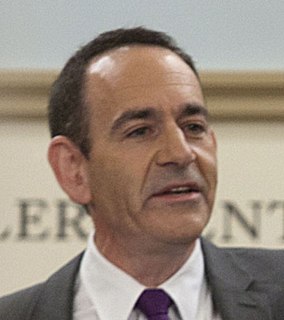
Franklin Delano Roosevelt, often referred to by his initials FDR, was an American politician and attorney who served as the 32nd president of the United States from 1933 until his death in 1945. A member of the Democratic Party, he won a record four presidential elections and became a central figure in world events during the first half of the 20th century. Roosevelt directed the federal government during most of the Great Depression, implementing his New Deal domestic agenda in response to the worst economic crisis in U.S. history. As a dominant leader of his party, he built the New Deal Coalition, which defined modern liberalism in the United States throughout the middle third of the 20th century. His third and fourth terms were dominated by World War II, which ended shortly after he died in office.

The 1944 United States presidential election was the 40th quadrennial presidential election. It was held on Tuesday, November 7, 1944. The election took place during World War II. Incumbent Democratic President Franklin D. Roosevelt defeated Republican Thomas E. Dewey to win an unprecedented fourth term. Until 1996, this would be the last time in which an incumbent Democratic president would win re-election after serving a full term in office.

Frank Anthony Sturgis, born Frank Angelo Fiorini, was one of the five Watergate burglars whose capture led to the end of the presidency of Richard Nixon. He served in several branches of the United States military and in the Cuban Revolution of 1958, and worked as an undercover operative for the Central Intelligence Agency.

Hugh Samuel Johnson was a U.S. Army officer, businessman, speech writer, government official and newspaper columnist. He is best known as a member of the Brain Trust of Franklin D. Roosevelt in 1932–34. He wrote numerous speeches for FDR and helped plan the New Deal. Appointed head of the National Recovery Administration (NRA) in 1933, he was highly energetic in his "blue eagle" campaign to reorganize American business to reduce competition and raise wages and prices. Schlesinger (1958) and Ohl (1985) conclude that he was an excellent organizer, but that he was also domineering, abusive, outspoken, and unable to work harmoniously with his peers. The NRA was terminated by a 1935 ruling of the Supreme Court, and Johnson left the administration after a little more than a year.

Michael Richard Beschloss is an American historian specializing in the United States presidency. He is the author of nine books on the presidency.

Arthur Meier Schlesinger Jr. was an American historian, social critic, and public intellectual. The son of the influential historian Arthur M. Schlesinger Sr. and a specialist in American history, much of Schlesinger's work explored the history of 20th-century American liberalism. In particular, his work focused on leaders such as Harry S. Truman, Franklin D. Roosevelt, John F. Kennedy, and Robert F. Kennedy. In the 1952 and 1956 presidential campaigns, he was a primary speechwriter and adviser to the Democratic presidential nominee, Adlai Stevenson II. Schlesinger served as special assistant and "court historian" to President Kennedy from 1961 to 1963. He wrote a detailed account of the Kennedy administration, from the 1960 presidential campaign to the president's state funeral, titled A Thousand Days: John F. Kennedy in the White House, which won the 1966 Pulitzer Prize for Biography or Autobiography.

David Talbot is an American journalist, author, activist and independent historian. Talbot is known for his books about the "hidden history" of U.S. power and the progressive movements to change America, as well as his public advocacy. He was also the founder and former editor-in-chief of the pioneering web magazine, Salon.

Peter Dale Scott is a Canadian-born poet, academic, and former diplomat.

David Pietrusza is an American author and historian.

Joseph Wright Alsop V was an American journalist and syndicated newspaper columnist from the 1930s through the 1970s. He was an influential journalist and top insider in Washington from 1945 to the late 1960s, often in conjunction with his brother Stewart Alsop.

Ilona Marita Lorenz was a German woman who had an affair with Fidel Castro in 1959 and in January 1960 was involved in an assassination attempt by the CIA on Castro's life.
Diana West is a nationally syndicated conservative American columnist and author. She writes a weekly column which frequently deals with controversial subjects such as Islam and is syndicated by Universal Uclick and appears in about 120 newspapers and news sites. She is the author of the books The Death of the Grown Up: How America's Arrested Development Is Bringing Down Western Civilization and American Betrayal: The Secret Assault on Our Nation's Character.
Gus G. Russo is an American author and researcher of the assassination of John F. Kennedy.

Mikhail Rachyanovich Sagatelyan was a Soviet journalist, author and KGB agent. He was head of the TASS news agency's United States bureau from 1959 to 1965, making him an important conduit of information between the United States and the Soviet Union during that period of the Cold War.

Timothy Naftali is a Canadian-American historian who is clinical associate professor of public service at New York University. He has written four books, two of them co-authored with Alexander Fursenko on the Cuban Missile Crisis and Nikita Khrushchev. He is a regular CNN contributor as a CNN presidential historian.

The assassination of John F. Kennedy on November 22, 1963, and the murder of Lee Harvey Oswald by nightclub owner Jack Ruby spawned numerous conspiracy theories. These theories allege the involvement of the CIA, the Mafia, Vice President Lyndon B. Johnson, Cuban Prime Minister Fidel Castro, the KGB, or some combination of these entities. The original FBI investigation and Warren Commission report, as well as an alleged "benign CIA cover-up", have led to the claim that the federal government deliberately covered up crucial information in the aftermath of the assassination. Former Los Angeles District Attorney Vincent Bugliosi estimated that a total of 42 groups, 82 assassins, and 214 people had been accused at one time or another in various conspiracy scenarios.
This bibliography of Franklin D. Roosevelt is a selective list of scholarly works about Franklin D. Roosevelt, the thirty-second president of the United States (1933–1945).

The first term of the presidency of Franklin D. Roosevelt began on March 4, 1933, when he was inaugurated as the 32nd president of the United States, and the second term of his presidency ended on January 20, 1941, with his inauguration to a third term. Roosevelt, the Democratic governor of the largest state, New York, took office after defeating incumbent President Herbert Hoover, his Republican opponent in the 1932 presidential election. Roosevelt led the implementation of the New Deal, a series of programs designed to provide relief, recovery, and reform to Americans and the American economy during the Great Depression. He also presided over a realignment that made his New Deal Coalition of labor unions, big city machines, white ethnics, African Americans, and rural white Southerners dominant in national politics until the 1960s and defined modern American liberalism.

The third presidential term of Franklin D. Roosevelt began on January 20, 1941, when he was once again inaugurated as the 32nd president of the United States, and the fourth term of his presidency ended with his death on April 12, 1945. Roosevelt won a third term by defeating Republican nominee Wendell Willkie in the 1940 United States presidential election. He remains the only president to serve for more than two terms. Unlike his first two terms, Roosevelt's third and fourth terms were dominated by foreign policy concerns, as the United States became a belligerent in World War II in December 1941.
The foreign policy of the United States was controlled personally by Franklin D. Roosevelt during his first and second and third and fourth terms as the president of the United States from 1933 to 1945. He depended heavily on Henry Morgenthau Jr., Sumner Welles, and Harry Hopkins. Meanwhile, Secretary of State Cordell Hull handled routine matters; the president ignored Hull on most major issues. Roosevelt was an internationalist, and Congress favored more isolationist solutions, so there was considerable tension before the Attack on Pearl Harbor in December 1941. During the war years, treaties were few, and diplomacy played a secondary role in high-level negotiations with the Allies of World War II, especially Britain's Winston Churchill and the Soviet Union's Joseph Stalin.
















